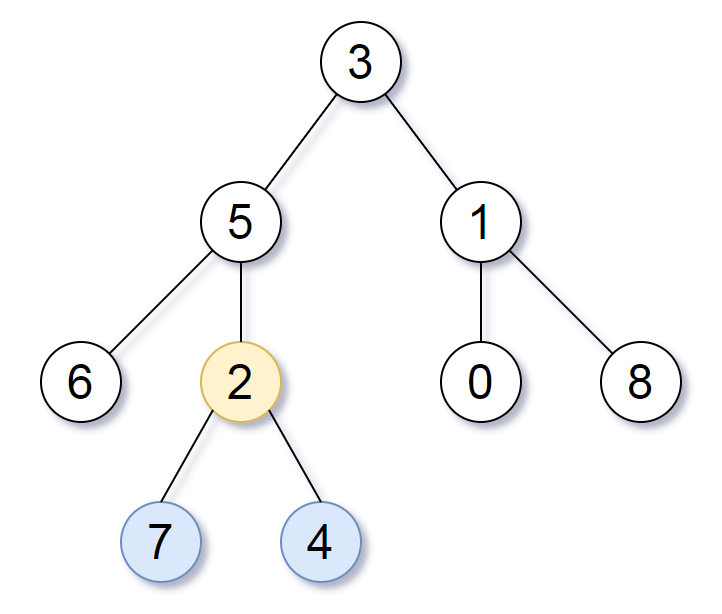Given the root of a binary tree, return the lowest common ancestor of its deepest leaves.
Recall that:
- The node of a binary tree is a leaf if and only if it has no children
- The depth of the root of the tree is
0. if the depth of a node isd, the depth of each of its children isd + 1. - The lowest common ancestor of a set
Sof nodes, is the nodeAwith the largest depth such that every node inSis in the subtree with rootA.
Note: This question is the same as 865: https://leetcode.com/problems/smallest-subtree-with-all-the-deepest-nodes/
Example 1:
Input: root = [3,5,1,6,2,0,8,null,null,7,4] Output: [2,7,4] Explanation: We return the node with value 2, colored in yellow in the diagram. The nodes coloured in blue are the deepest leaf-nodes of the tree. Note that nodes 6, 0, and 8 are also leaf nodes, but the depth of them is 2, but the depth of nodes 7 and 4 is 3.
Example 2:
Input: root = [1] Output: [1] Explanation: The root is the deepest node in the tree, and it's the lca of itself.
Example 3:
Input: root = [0,1,3,null,2] Output: [2] Explanation: The deepest leaf node in the tree is 2, the lca of one node is itself.
Constraints:
- The number of nodes in the tree will be in the range
[1, 1000]. 0 <= Node.val <= 1000- The values of the nodes in the tree are unique.
# Definition for a binary tree node.
# class TreeNode:
# def __init__(self, val=0, left=None, right=None):
# self.val = val
# self.left = left
# self.right = right
class Solution:
def lcaDeepestLeaves(self, root: Optional[TreeNode]) -> Optional[TreeNode]:
def dfs(root):
if root is None:
return None, 0
l, d1 = dfs(root.left)
r, d2 = dfs(root.right)
if d1 > d2:
return l, d1 + 1
if d1 < d2:
return r, d2 + 1
return root, d1 + 1
return dfs(root)[0]/**
* Definition for a binary tree node.
* public class TreeNode {
* int val;
* TreeNode left;
* TreeNode right;
* TreeNode() {}
* TreeNode(int val) { this.val = val; }
* TreeNode(int val, TreeNode left, TreeNode right) {
* this.val = val;
* this.left = left;
* this.right = right;
* }
* }
*/
class Solution {
public TreeNode lcaDeepestLeaves(TreeNode root) {
return dfs(root).getKey();
}
private Pair<TreeNode, Integer> dfs(TreeNode root) {
if (root == null) {
return new Pair<>(null, 0);
}
Pair<TreeNode, Integer> l = dfs(root.left);
Pair<TreeNode, Integer> r = dfs(root.right);
int d1 = l.getValue(), d2 = r.getValue();
if (d1 > d2) {
return new Pair<>(l.getKey(), d1 + 1);
}
if (d1 < d2) {
return new Pair<>(r.getKey(), d2 + 1);
}
return new Pair<>(root, d1 + 1);
}
}/**
* Definition for a binary tree node.
* struct TreeNode {
* int val;
* TreeNode *left;
* TreeNode *right;
* TreeNode() : val(0), left(nullptr), right(nullptr) {}
* TreeNode(int x) : val(x), left(nullptr), right(nullptr) {}
* TreeNode(int x, TreeNode *left, TreeNode *right) : val(x), left(left), right(right) {}
* };
*/
using pti = pair<TreeNode*, int>;
class Solution {
public:
TreeNode* lcaDeepestLeaves(TreeNode* root) {
return dfs(root).first;
}
pti dfs(TreeNode* root) {
if (!root) return {nullptr, 0};
pti l = dfs(root->left);
pti r = dfs(root->right);
int d1 = l.second, d2 = r.second;
if (d1 > d2) return {l.first, d1 + 1};
if (d1 < d2) return {r.first, d2 + 1};
return {root, d1 + 1};
}
};/**
* Definition for a binary tree node.
* type TreeNode struct {
* Val int
* Left *TreeNode
* Right *TreeNode
* }
*/
type pair struct {
first *TreeNode
second int
}
func lcaDeepestLeaves(root *TreeNode) *TreeNode {
var dfs func(root *TreeNode) pair
dfs = func(root *TreeNode) pair {
if root == nil {
return pair{nil, 0}
}
l, r := dfs(root.Left), dfs(root.Right)
d1, d2 := l.second, r.second
if d1 > d2 {
return pair{l.first, d1 + 1}
}
if d1 < d2 {
return pair{r.first, d2 + 1}
}
return pair{root, d1 + 1}
}
return dfs(root).first
}
